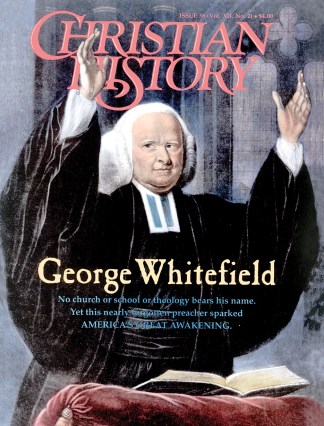When George Whitefield preached his first sermon, at age 21, someone complained to the bishop that Whitefield (pronounced WlT-field) had driven 15 people insane.
Anglican ministers of the day were controlled, dignified, even stuffy in preaching. Whitefield, though, was intense, emotional, and dramatic. “I could hardly bear such unreserved use of tears,” wrote one observer, for Whitefield was “frequently so overcome, that, for a few seconds, you would suspect he never could recover.” Whitefield explained, “You blame me for weeping, but how can I help it when you will not weep for yourselves, though your immortal souls are on the verge of destruction?”
In America, Whitefield was a sensation. His impassioned preaching on the “New Birth” in 1739 helped spark what historians have called The Great Awakening. It’s easy to “underestimate the effect of the Awakening on eighteenth-century society,” writes Richard Bushman in The Great Awakening, 1740–1745. “The Awakening was more like the civil-rights demonstrations, the campus disturbances, and the urban riots of the 1960s combined.”
But in colonial America, the social upheaval was caused chiefly by one young British field preacher who considered himself “less than the least of all.” Whitefield traveled from New Hampshire to Georgia (where he founded America’s first charity) and unified the colonies as no one had before. Thousands discovered, as one Connecticut farmer put it, “my righteousness would not save me.”
An American First
In Boston, Thomas Prince, Jr., a leading supporter of the Awakening, decided to launch something never seen in the colonies: a religious magazine. The Christian History contained accounts of this astounding “propagation and revival of religion.”
The premier issue in March 1743 reported awakening in Kilsyth, Scotland: “The bodies of some of the awakened are seized with trembling, fainting, histerisms in some few women, and with convulsive motions in some others, arising from the apprehension and fear of the wrath of God … ”
Like its historic namesake, today’s Christian History seeks to provide “authentick accounts” and “give the reader the most remarkable passages, historical and doctrinal, out of the most famous old writers.”
Copyright © 1993 by the author or Christianity Today/Christian History magazine. Click here for reprint information on Christian History.










